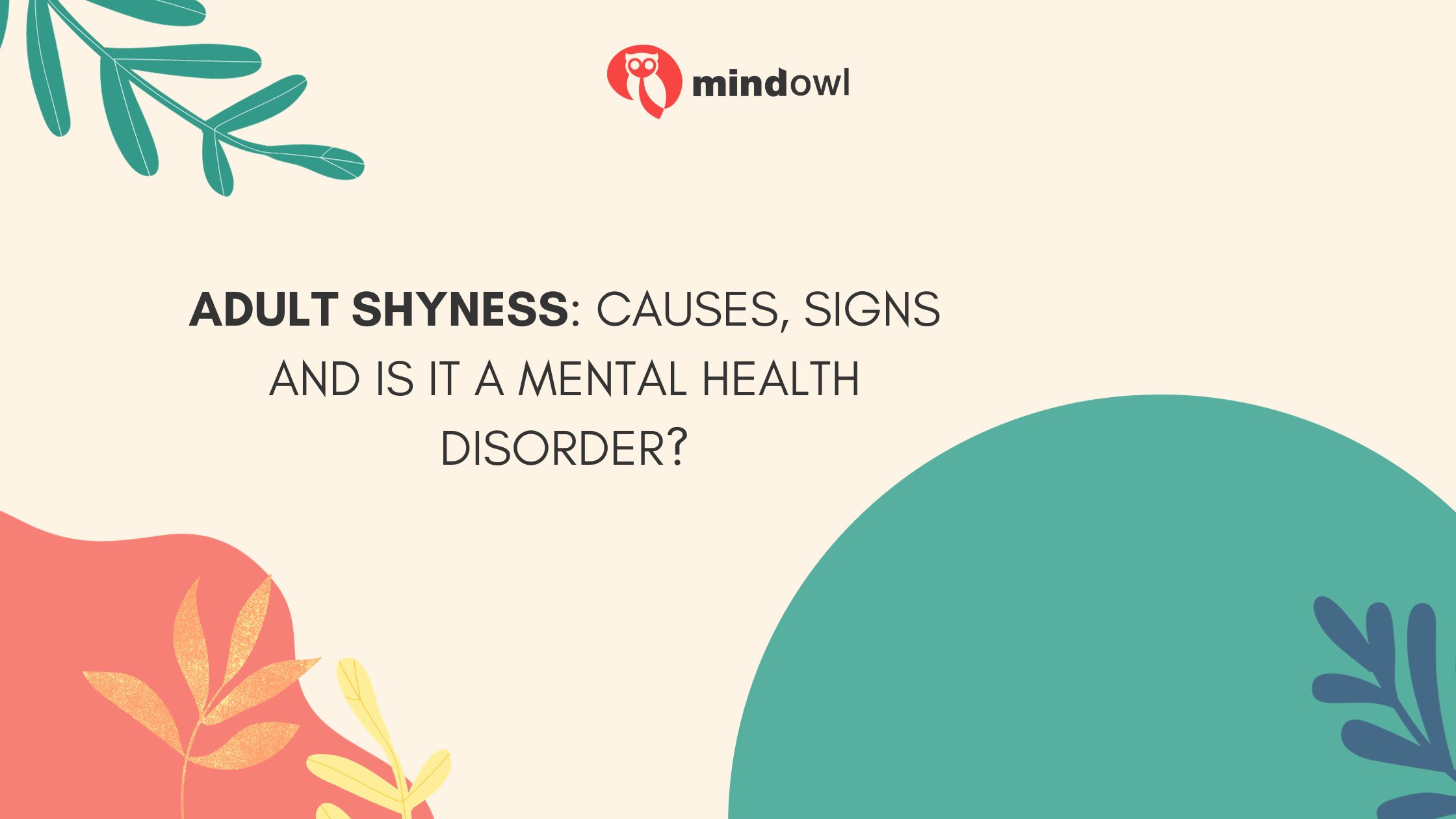
Feeling a bit awkward in social settings isn’t unusual, but for some adults, shyness can feel like a sturdy wall between them and the rest of the world. Research suggests that around 40% of people identify as shy, which means you’re definitely not alone if mingling at parties or speaking up in meetings sends your heart racing.
This post is here to shine a light on adult shyness–unravelling its causes, signs, and whether it steps into the realm of mental health disorders. Dive in to discover strategies and insights that can help you edge past shyness and embrace connection with confidence!
Key Takeaways
- Shyness makes some adults feel nervous in social situations because they worry about what others think. This can stop them from doing things like talking to people or joining in at work.
- If someone’s shyness gets in the way of their everyday life, it could be a sign of a bigger problem called social anxiety disorder. Therapy or counselling, especially Cognitive Behavioral Therapy (CBT), can help with this.
- Being shy often comes from how you were raised, your past experiences, scary events you’ve lived through, and even your body’s makeup. It’s not just how you act; it can come from deep inside you.
- The signs of severe shyness include avoiding being around people, feeling very anxious when meeting new folks, and having physical signs like a fast heartbeat or sweating.
- There are ways to get better if you’re really shy. You can talk to someone who knows how to help or learn tricks that make talking to others easier. With practice and support, many people become less shy over time.
What is Shyness?

Definition of shyness
Shyness is when a person feels nervous or uncomfortable around others. This can happen in new situations or when they have to meet new people. It often comes with feelings like being self-conscious, worrying about what others think, and fearing they might be judged or rejected.
Shy individuals might feel their heart race, get sweaty palms, or have a shaky voice when they are with other people.
There are different types of shyness as well. Some folks may only feel shy in certain social events, like public speaking or parties full of strangers. Others might always find it hard to start a conversation or make small talk no matter where they are.
Next, let’s look into how shyness shows up in adults.
Types of shyness
There are many ways people can be shy. Some feel shy all the time, while others might only feel it in certain situations.
- Social shyness: This kind happens when people feel nervous or uncomfortable in social settings. They might find it hard to talk to new people or join groups.
- Situational shyness: Here, someone is only shy in specific situations, like speaking in front of a group or meeting someone important.
- Shy extroverts: These individuals enjoy being around others but still feel self-conscious. They may appear outgoing but often battle with inner feelings of nervousness.
- Chronic shyness: This type is deep-seated and can impact a person’s life heavily, as the feeling of being shy is almost always present.
- Introverted shyness: People with this type prefer small groups or alone time but not because they’re anxious — it’s just their personality.
- Shy children who remain shy adults: Sometimes, kids who are very shy grow up to be adults with the same traits if they don’t learn ways to manage their feelings.
Shyness in Adults

When shyness becomes a problem
Sometimes, being shy can stop a person from doing everyday things. It might get in the way of talking to others or going out with friends. If someone feels very scared or nervous about being with people, it may be more than just shyness.
This kind of fear can make a person stay away from places and chances to meet new folks.
Feeling too shy can mean you miss out on fun activities or making friends. People who are very shy often find it hard to speak up at work or join in games. They might feel bad inside and think they can’t do what other people do easily.
If shyness makes someone feel unhappy most days, it could be a sign of social anxiety disorder. This is when worry about what others think stops you from living your life the way you want.
Impact on daily life and relationships
Being shy can make daily life hard. It might stop you from going to parties, meeting new people, or speaking up at work. This can lead to feeling lonely and unhappy. Sometimes it’s tough to join in even when you want to.
You may avoid social events because they scare you too much.
Shyness affects relationships as well. You could find making friends or dating very difficult. If you’re really shy, you might not talk much with others or share your feelings easily.
This can make it hard for other people to get close to you and understand who you are.
Causes of Shyness in Adults
Shyness in adults can be caused by a variety of factors, including parenting styles, past experiences, traumatic events, and biological factors. Understanding these causes is crucial in addressing and overcoming adult shyness.
Parenting
Parents play a big part in whether a child becomes shy. Emotional sensitivity and being easily scared as babies can make kids turn out shy later on. The way parents react to their child’s actions matters too.
If they are very hard on the child or don’t show warmth, the kid might grow up feeling less sure of themselves. It’s important for parents to give support and teach social skills so children can feel more confident around people.
Some parents might not know how to deal with shyness in their children which could lead to problems as the kids become adults. They may end up fearing judgment from others, even if they want to join in with everyone else.
This fear can hold them back at school, work, or when making friends. Giving love and building self-esteem from an early age helps a lot in overcoming shyness and social anxiety later on.
Past experiences
Sometimes things that happened to us before can make us feel shy. If you were teased or had a hard time at school, you might find it tough to talk to new people now. Bad memories can stick around and make you worry about the same stuff happening again.
You may start thinking badly about yourself or be scared that others won’t like you. This fear of being judged can be really strong and stop an adult from joining in on fun activities or making friends.
If bullying or a big scare hurt someone when they were younger, they often carry this fear into grown-up life. They can end up feeling all alone and get very sad or nervous. Adults who went through these hard times may struggle with trusting others and themselves, which makes them pull away from social situations where they think they could be laughed at or not accepted.
Traumatic events
Traumatic events can cut deep into a person’s life. Things like bad accidents, major losses, or harmful experiences when someone is small might make them very shy later on. These hard times can stir up fear and worry that stick around for years.
Many adults who feel extreme shyness or have social anxiety disorder may carry the weight of these past traumas.
Even if everything seems okay now, those scary memories can make it tough to talk with people or be in groups. It’s not rare for someone to develop signs of anxiety because of what they’ve been through as kids.
This could show up as being scared to meet new people or sweating and shaking during a chat with a stranger. After learning about how traumatic events affect shyness, let’s explore what biology has to do with feeling shy.
Biological factors
Traumatic events can have a long-lasting impact, but it’s also essential to consider biological factors that contribute to shyness in adults. Research suggests that genetics play a significant role in shyness, as identical twins often exhibit similar levels of shyness.
Studies have found a genetic component linked to shyness, indicating that some individuals may be predisposed to shyness due to their genetic makeup. Additionally, vascular disease risk factors and urinary free cortisol levels have been associated with shyness and gender interactions among older adults.
These biological factors shed light on the complex interplay between genetics and physiological indicators contributing to adult shyness.
Signs of Severe Shyness and Social Anxiety Disorder
Some signs of severe shyness and social anxiety disorder include difficulty with social interactions, avoidance of certain situations, and physical symptoms like increased heart rate or sweating.
To understand more about these signs and how to overcome them, continue reading.
Difficulty with social interactions
Social anxiety disorder often involves difficulty with social interactions, leading to significant anxiety and self-consciousness in everyday situations. People with this condition may feel intense fear of being watched and judged by others, affecting their work, school, and daily activities.
This can manifest as a persistent avoidance of certain social situations or a strong reluctance to engage in small talk or make eye contact with others.
The defining feature of social anxiety disorder is the intense fear of negative evaluation in social settings. Consequently, individuals may experience physical symptoms such as trembling, sweating, blushing or feeling nauseous when faced with social interactions.
Avoidance of certain situations
People with severe social anxiety and shyness often avoid situations that trigger their anxiety, such as social gatherings, public speaking, eating in front of others, or using public restrooms. This avoidance can significantly disrupt their daily life and routines. For example, they may turn down invitations, change jobs to avoid interactions, or completely withdraw from social activities.
While avoiding anxiety-provoking situations may provide temporary relief, it prevents the person from learning how to manage their anxiety. It also reinforces the belief that those situations are too frightening to handle
Prolonged avoidance can increase the fear and anxiety over time. It is an obstacle in overcoming social anxiety that perpetuates the disorder
Physical symptoms
In addition to avoiding anxiety-provoking social situations, people with severe shyness or social anxiety often experience intense physiological symptoms when forced to be social. Common symptoms include profuse sweating, trembling, nausea, feeling lightheaded or dizzy, heart palpitations, shortness of breath, and gastrointestinal discomfort or diarrhoea. They may also visibly blush or turn red, stutter or have difficulty speaking, and appear very rigid or tense in social interactions.
These physiological symptoms of anxiety can be extremely embarrassing and uncomfortable, further reinforcing avoidance behaviours.
With treatment such as cognitive behavioural therapy, people can learn to manage both the emotional and physiological symptoms of their social anxiety. Medications may also help relieve some of the physical symptoms.
Overcoming Shyness and Social Phobia
If you struggle with shyness or social phobia, there are steps you can take to overcome these challenges. Seeking therapy or counselling, particularly cognitive behavioural therapy (CBT), can be effective in helping individuals build self-confidence and develop strategies for managing their anxiety in social situations.
It’s important to remember that with the right support, it is possible to find ways to feel more comfortable and confident when interacting with others.
Seeking therapy/counselling
If you’re struggling with shyness that significantly impacts your daily life and relationships, seeking therapy or counselling can be immensely beneficial. Cognitive Behavioural Therapy (CBT) is a proven method to address social anxiety disorder effectively.
Research shows that CBT is more effective than medications for adults dealing with shyness. Psychotherapy can help individuals recognise and change negative thoughts, leading to improved symptoms in most people with social anxiety disorder.
By undergoing therapy or counselling, individuals can learn valuable techniques to manage their shyness and build self-confidence, ultimately improving their overall quality of life.
Cognitive Behavioral Therapy (CBT)
CBT, or Cognitive Behavioural Therapy, is a powerful approach to help individuals with social anxiety disorder. This therapy teaches new ways of thinking, behaving, and reacting to situations to reduce anxiety and fear.
It’s the most effective treatment for people suffering from social anxiety disorder. Through CBT, individuals can recognise and change negative thoughts that contribute to their symptoms.
This therapy also focuses on the idea that mental health symptoms come from unhelpful thought patterns, offering practical techniques for managing and reducing these symptoms in day-to-day life
.Building self-confidence
Building self-confidence is vital for overcoming shyness and social anxiety. Here’s how you can do it:
- Reframe your thoughts:. Mindfully identify distorted thinking, examine the evidence against it, and purposefully shift perspective using balanced thinking and supportive tools like journaling
- Set achievable goals: Start with small, attainable goals, like initiating a conversation with someone new or speaking up in a group. As you accomplish these, your confidence will grow.
- Practise assertiveness: Learning to express your needs and opinions respectfully can enhance your confidence in social interactions.
- Focus on strengths: Recognise your skills and talents. This can help shift the focus from perceived weaknesses to positive attributes, bolstering self-confidence.
- Seek support: Surround yourself with supportive friends or join groups where you feel comfortable expressing yourself. Knowing that you have a supportive network can boost confidence.
- Embrace self-care: Taking care of your physical and emotional well-being through exercise, nutrition, and relaxation techniques can contribute to a positive self-image and increased confidence.
- Reflect on past successes: Remind yourself of times when you’ve faced challenges or fears and emerged victorious. Reflecting on past achievements can reinforce confidence for future endeavours.
Conclusion
In conclusion, adults’ shyness can significantly impact their daily lives and relationships. It’s essential to recognise the signs of severe shyness or social anxiety disorder, such as difficulties with social interactions and avoidance of certain situations.
Seeking therapy or cognitive behavioural therapy can help individuals overcome shyness and build self-confidence. Addressing adult shyness is important as it can have consequences on one’s life, but with the right support, it is possible to manage and overcome these challenges.
FAQs
1. What causes someone to be shy?
Shyness in adults can come from many things like how they grew up, their natural temperament, or feeling fear and anxiety in social scenes.
2. Are there signs that show if you’re shy?
Yes, shy people may feel awkward around others, find it hard to make small talk, and might worry about being judged or rejected by others.
3. Can shyness affect your mental health?
It’s possible. While shyness itself isn’t a mental health disorder, it can lead to social anxiety if the person has a strong fear of social situations that stays for a long time.
4. If I’m an adult and still shy, do I have to change?
Not at all! Remember that shyness doesn’t mean you have to change yourself; some people simply prefer less crowded spaces or more one-on-one talks.
5. How can someone overcome being shy?
You can try group therapy where you face your fears with others who understand, or work on boosting your self-esteem through positive actions and thoughts.
6. Is there a difference between just being shy and having social anxiety?
Yes! Shy people often keep back even when they want to join in but dealing with social anxiety includes more intense symptoms of anxiety that are beyond their control.
MindOwl Founder – My own struggles in life have led me to this path of understanding the human condition. I graduated with a bachelor’s degree in philosophy before completing a master’s degree in psychology at Regent’s University London. I then completed a postgraduate diploma in philosophical counselling before being trained in ACT (Acceptance and commitment therapy).
I’ve spent the last eight years studying the encounter of meditative practices with modern psychology.


